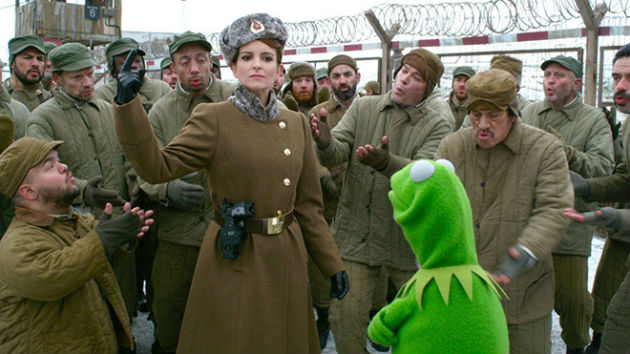
Courtesy of Walt Disney Studios Motion Pictures
As you probably heard, Russia invaded Ukraine. This has been big international news for the past few weeks, and now it is even affecting how people cover and review the new Muppets movie.
In Muppets Most Wanted (released on Friday), the antagonist is Constantine the Frog, a notorious criminal with a thick Russian accent. He also looks an awful lot like Kermit the Frog. Early in the film, Constantine escapes from a gulag in Siberia, tracks down Kermit, steals his identity, and gets the good-natured Kermit thrown in the Russian labor camp in his place. (Tina Fey plays Nadya, the officer who runs the song-and-dance-obsessed gulag.)
The Russia content in Muppets Most Wanted grew out of the filmmakers’ desire to create a “classic cold-war musical comedy,” and to give a lighthearted nod to the Russian bad guys of 1980s movies. Director James Bobin and Nicholas Stoller of course had no idea that their new Muppet movie would hit theaters right around the time Russia annexed Crimea. Constantine is a world-infamous thief, not a stand-in for Putin or any Russian politician (not that the Muppets haven’t dabbled in politics—or been accused of partisan bias—before). Regardless, critics and writers found a way to make their coverage of Muppets Most Wanted more topical!
Here’s a sample:
- “The newest Muppet is Russian, prefers to go shirtless and is intent on evil domination. Sound familiar?” — USA Today.
- “The one discordant note comes by way of the gulag gags: With Russian President Vladimir Putin enthusiastically reviving that country’s most oppressive totalitarian past, making light of what now seems all too real may strike adult viewers as, if not tasteless, then at least unfortunately timed. (The backfire also serves as a cautionary reminder to studio executives eager to exploit the newly all-powerful international market.)” — The Washington Post.
- “The United States government today called on Walt Disney Pictures to delay or cancel the release of Muppets Most Wanted on national security grounds. Or at least, it should have. Not only might this movie annoy Russia, with whom the American government is already nose-to-nose over Crimea, but it could also cause any European allies being courted by President Obama to unfriend him and the rest of the country. The film, a music-filled follow-up to the 2011 hit The Muppets, lands poor Kermit in a gulag in Siberia, which is depicted just as unflatteringly as gulags in Siberia always are. Vladimir V. Putin is unlikely to be amused.” — The New York Times.
- “The film’s female lead, Miss Piggy, arguably bears some resemblance to German Chancellor Angela Merkel, whose stance on Russia has toughened considerably as the Crimean crisis unfolds.” — Radio Free Europe/Radio Liberty.
- “He’s kidnapped and replaced by evil frog Constantine, Kermit’s exact double apart from a facial mole and an accent that sounds like Vladimir Putin trying to invade his space.” — The Toronto Star.
…Ugh.
Now, for something better, listen to Muppets Most Wanted‘s fun, self-referential musical number “We’re Doing a Sequel” below:













